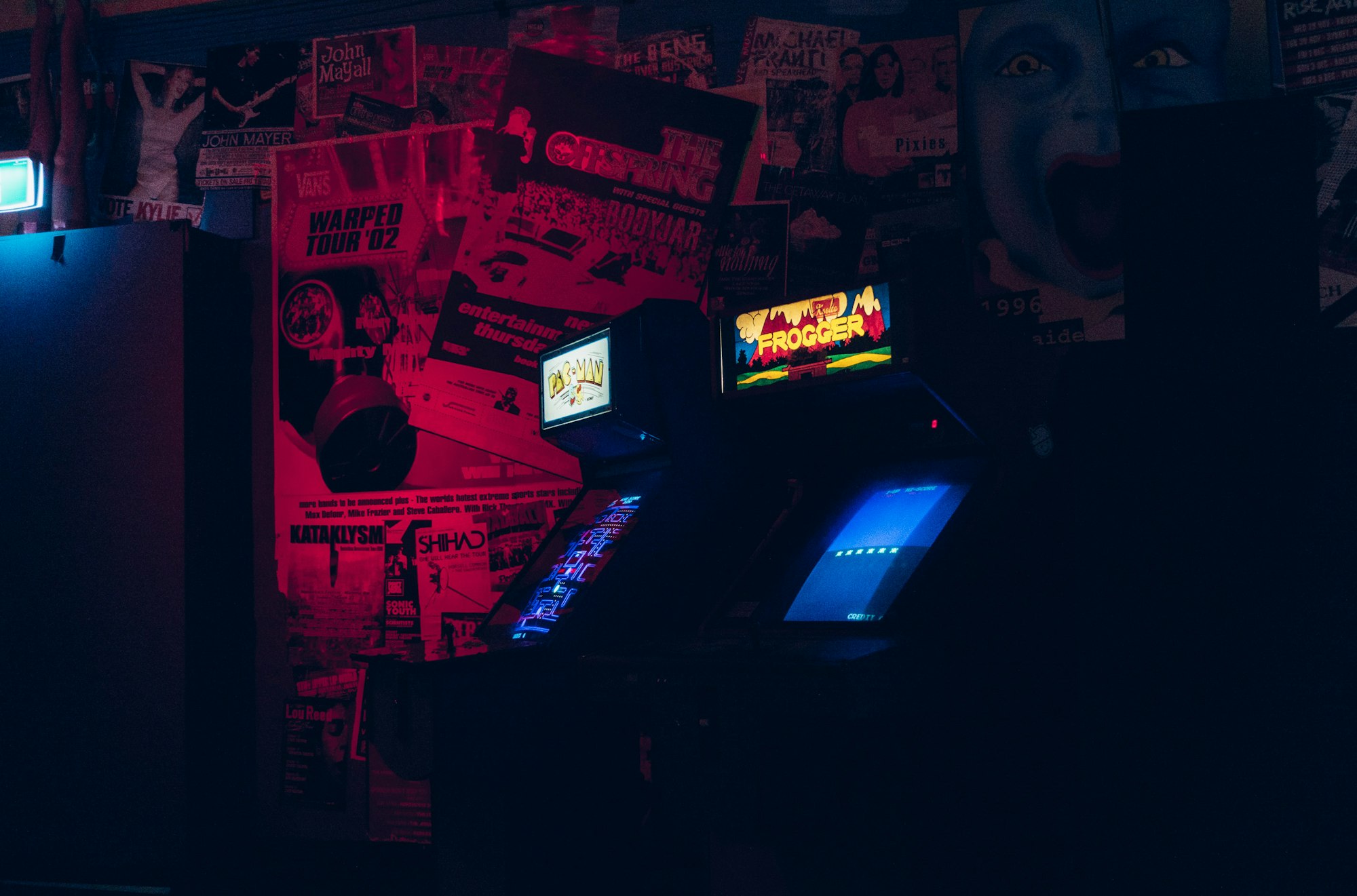Gaming Needs a Library
Curating the history of virtual titles begins with a physical space

Libraries, one of the most important publicly funded institutions in modern society, are something we often take for granted.
Libraries are phenomenally necessary public community spaces where one can find Stephen King, Beyoncé, Alan Moore and David Lynch under one roof, freely accessible. The materials that are available at your local library are there based on their own merits, donated and curated by the tireless and thankless staff of the institution. For all their importance, these spaces should also share their shelves with Square Enix, From Software, and Annapurna Interactive.
Socially Interactive History
The world’s first systemically organized library was created in the seventh century. Ashurbanipal of Nineveh, Assyrian king and conqueror, was a noted bibliophile that gathered some thirty thousand cuneiform tablets, archival documents, scholarly texts, and pieces of literature — including a copy of the Epic of Gilgamesh, one of the earliest known pieces of modern literature.
Ashurbanipal’s collection was a comprehensive accomplishment, existing in what would become modern day Iraq. Of his collection were varying genres, religious documents, the handbooks of personal scribes, traditional local stories, and artifacts. He also kept written accounts of human and animal behaviors, as well as the movement of celestial bodies. Ashurbanipal’s impressive library is the reason we have many priceless historical texts to this day, translated from cuneiform to paper to digital device. The structure of this library was because of its owner’s impeccable curiosity and became a cornerstone of his rule.
This royal library, while curated for the erudite obsessions of its king, became the foundational concept for archiving knowledge. Personal archives existed long before Ashurbanipal, but the library’s public history would not become mainstream until hundreds of years later.
While the Persian Empire had archived its own histories between 300 and 500 C.E., and the Library of Alexandria and House of Wisdom are infamous for their mythologized stacks, community libraries have a fairly brief history. Every nation from the Aztecs to the Mayans to the Chinese has categorized, stored, and cultivated their personal histories, but this information was not always so widely disseminated. The Dark Ages — a period infamous for medieval savagery — is named not because of a societal gloom, but because there was a significant lack of cultural and scientific advancement during this period, with a lack of stored and collected information, until the Renaissance in the fifteenth century. When societies do not properly archive their stories, achievements, and knowledge, they face a doom of culture.
A Place In Society
Libraries have long been the cornerstones of society, the backbones of culture and community. They are how the public can freely access stored physical and digital information. Libraries are centers of knowledge with little barrier of entry.
The modern library has been structurally important for everyone, from students to teachers to office workers, even in the internet age. Libraries are not only the primary way to find books for people of any income level, but have been significant societal markers that provide services to their local communities. An excellent library reflects that community, and makes readily available an array of documents, from books to cassettes to CDs to DVDs to newspapers. When libraries are made public and backed by the federal government, we can count them among the most significantly useful investments of taxation. The rise and fall of nations can be marked by how they invest in their libraries, the inclusion of free internet access, and publicly available online networks.
It is frankly absurd that I cannot walk down to my local library and check out a rare PlayStation 2 game, including the hardware necessary to play it on — and many local libraries agree.
All across the country, libraries are arguing their own cases for why video games should be easily and widely available via their institutions.
“Games deserve their place among the other significant cultural media of our time, on par with television and graphic novels.” — Dr. Guy Berthiaume, the CEO of the Bibliothèque et Archives nationales du Québec (BAnQ).
Video game scarcity has become an epidemic. While many video games have become digitized completely, the barrier for entry is absurd.
Many games have become “accessible” via predatory subscription models, inferior remakes and remasters, or emulation. The unfettered back and forth of second-hand markets have brutalized physical copies. Games that were once available for $40 are now $300. Not to mention that for many older titles, the scarcity has been upscaled by technology obsessing with constant improvement and erasure — the TVs, consoles, and controllers you need to play classic titles are simply unavailable.
Gaming Is For Everyone
The concept of a widely accessible gaming library becomes more necessary by the year, as the industry attempts to streamline its future by erasing its past. Scholars have argued that videogames are essential to urban academia. Entire video game series are actively curated by YouTube essayists and streamers who have access to unavailable titles via budget or emulation, the experience of actually playing the game yourself locked behind thick layers of paywall.
As capitalism steadily ramps itself towards absurd heights and everything has a steep price, the most obscure games are now simply out of reach for much of the populace that would like to play them. Regardless of your income level, video games should be available to you.
“Video games are both effective community builders and catalysts for increased awareness and usage of library sources and services.” — Play Time: Why Video Games are Essential to Urban Academic Libraries, Christina Boyle
Video games have become an integral part of modern literacy. Beyond their obvious literary value in reading and idea comprehension, games both encourage content creation and enrich vocabularies through their multifaceted and multilayered ideas, including the format that presents these ideas. In the indie market, video games tackle complex concepts around identity and individualism and present them within a format already familiar for its entertainment value.
The solution for a video game library is complicated. Rights would have to be agreed upon by dozens of companies, and availability may initially be scarce. The safety of the system might rest in libraries, lending out physical copies that have been emulated or replicated, not to mention structuring a digital space for free access to older titles. Librarians themselves have argued that video games belong in libraries, and they deserve their own place on the shelf. While some games of previous console generations are accessible on the Nintendo Switch or Xbox, vast swathes of games are simply gone unless you still own the copies and have the consoles to play them on. The Nintendo DS, 3DS, and PSP are infamously dire systems with hundreds of games simply unavailable outside their consoles, and remarkable classics such as Golden Sun are not currently playable in any format except for emulation or the original Game Boy Advance.
The Future Of Gaming Is Public Access
Like many societies before us, we are watching one of the greatest mediums of the modern age slip through our fingers because of an arrogant lack of proper curation, restoration, and preservation. Video games feel modern by their own standards, with many games and series only a few decades old, but time is rapidly marching on.
While it’s easy to direct someone towards Ocarina of Time now, how will we access this classic in thirty years? Are we, collectively as a society of gamers, simply okay with the notion that some of our favorite games might not exist at all by the time we are grandparents?
Without a communal, collective, socially funded gaming library, there will be no protections for the games we love beyond the whims of the companies who own their rights.
While many local libraries have been steadily including video games over the last few years, putting games into circulation is difficult, and the actual games available are a mixed bag. Both very new and very old games are more difficult to acquire, and libraries still operate on a budget. There remains a barrier of entry to access video games via a library, but any availability pushes it in the right direction. Just like with novels, video games are a way to experience exciting and foreign worlds in a safe space. With adequate funding, entire generations could have access to gaming in the public sphere — and this should include the ability to play games at the library itself.
The movement is on the rise — about 15% of all American libraries now have video games that can be checked out with a library card. The only way we are going to propagate and curate this art form we love so much is to hold public collections to the same degree as our personal ones. We are a part of a gaming community, a community that should care about accessibility and history. It should be as easy to walk out of a library with a copy of Ape Escape as it is with a copy of Pride & Prejudice.
